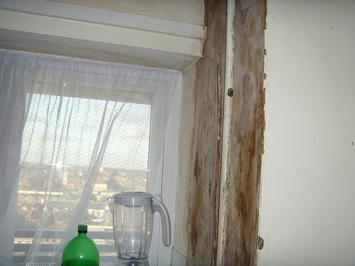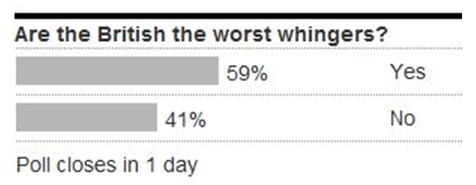
Busted. "Even in the best of times, whinging, as Britons call the persistent low-grade grousing that is their default response to life’s challenges, is part of the national condition", Sarah Lyall writes in the New York Times, about Londoners’ failure to embrace the Olympic Spirit. If a British newspaper mocked America there would be a flood of patriotic remonstrance right back at us. But when The Guardian asked its readers whether it was true that Britons were whingers, this is how the poll went:

There is a lot to complain about with the Olympics. The police have been heavy-handed, pushing around people who have argued with the Olympic hype. The Olympic Park has been forcibly cleared of its official and unofficial tenants.
Dave Renton, author of Lives; Running, who believes in the Olympics but not in the corporate hype and security that comes with it explains:
Already the park is enclosed by a sky high fence, topped by razor wires and electronic sensors, with CCTV every few metres and security patrols inside the fence, all to protect the Park from intruders. But in addition the towpath was closed to public access 23 days before the Olympics even began. All across London on the edge of Olympic venues there have been similar restrictions imposed. (see his Olympics-and-other sports blog, http://livesrunning.wordpress.com/)
Most shockingly, the army has put surface to air missiles on the roofs of local tower blocks, to the outrage of the residents, who see them as a threat against London’s rioting youths rather than any imagined Al Qaida attack. Pointedly, the one estate that has welcomed the installation is the Bow Quarter, a super-rich gated community in the heart of impoverished East London (the site, ironically, of the re-birth of British trade union struggle in the nineteenth century, the Bryant and May match factory).
There are special Olympic lanes painted on the roads, like those that the old Soviet bureaucracy had for the Zil limousines carrying officials. We are warned that spectators wearing the wrong logo will be barred from the stadium, as will Tibetan flags and any kind of political slogan.
There is much to complain about, but Sarah Lyall is right: scoffing is the British way. Poor Sebastian Coe, goody-two-shoes of the 1980s track, has a hard job selling the Olympics to the British public. This coming Saturday radicals of the counter Olympics network will meet at noon to protest in Mile End Park.
Of course Briton’s have not been big on public celebration since they lost that last toe-hold on world domination, as subalterns to the United States in the Cold War. The Falklands War against Argentina (oh, the shame!) was the last that drew out a jingo crowd. Ever since the Berlin Wall came down, we only come out on the streets to object or mourn. That is why the Millennium celebrations drew such a vicious reaction from the intelligentsia here, and why the most recently celebrated Queen’s Jubilee was such a damp squib. By contrast, hundreds of thousands mourned the death of Princess Diana, and perhaps a million marched against the war in Iraq.
It is not easy to be a British sporting star. Jaded Britons willed Wimbledon tennis finalist Andy Murray to lose with the fervour that in years gone by they would have willed him to win. England's soccer captain, John Terry, is better known for swearing at Anton Ferdinand than for his defending skills (after a failed prosecution for racial abuse, the press, unwilling to accept the jury’s decision, found him guilty anyway). The mood behind team GB in London right now is markedly downbeat. Londoners’ main interest has been whether they could make any money letting out their homes (no, it turns out, the market was flooded).
The mood is not helped by the downbeat promotion. Filmmaker Danny Boyle is in charge of the opening ceremony. He says he will not follow the Beijing triumphalism, but instead threatens a mawkish recreation of the English countryside, complete with sheep and even a mob of countercultural festival hippies. On television, Britons follow not the hype, but a mockumentary satire of the hype, Twenty Twelve.
The London that Britain will showcase to the world is at a difficult crossroads. It is the centre of the financial services sector, Britain’s most successful export since deregulation in the 1980s, but currently mired in successive crises, most recently the manipulation of the LIBOR rate by Barclays (with the apparent connivance of not only shamed Chief Exec Bob Diamond, but the Governor of the Bank of England, too). There is little doubt that Britain’s economy is dangerously skewed in favour of its financial sector, which buys influence from out-of-touch and cash-hungry politicians. Sadly, the one occasion when the financial sector might have been reined in, the crash of 2008, led to a massive bailout instead. Advice from financiers that the banks were ‘too big to fail’ was accepted with much the same gullibility as advice from the securocrats that Iraq’s weapons of mass destruction could strike London in 15 minutes. In the manner of a naïve maiden aunt, the press and the politicial establishment here were repeatedly surprised that the billions the government gave the bankers went straight into bonuses, instead of being passed on as loans to businesses. Did no one ever tell them that banks are in the business of making money, not giving it away?
The problem with the banks, in any event, is misunderstood. The febrile financial sector is more symptomatic than causal. It has been fuelled for some years by the surplus capital that British and European industry fails to reinvest in its manufacturing base. Europe’s risk-averse business leaders are reluctant to disturb their cozy relations with each other and government by innovating new processes or products. Where their forebears ploughed profits back into the business, our business leaders prefer to put them in the bank, hunting around for some fantasy of high yield investments that do not entail any relationship more demanding than a phone-call. It is not that bankers steal the cash from business so much as that business that is falling over itself to give it up.
High on the list of London’s problems is its house-building industry, which has systematically failed to meet the expanding demand for homes. Characteristic of the institutional prejudice against development here, house-building has been stymied by a planning system that restricts building to brownfield sites, and is strangling London’s growth with a ‘green belt’.
Predictably, the limit on building new houses has forced up prices, and priced poorer Londoners out of central London. According to a study by Tom MacInnes and Peter Kenway for the City Parochial Foundation:
… more than half (54%) London’s low income population live in Outer London. This is an increase compared to the late 1990s, when London’s low-income population was split equally between Inner and Outer London. Reflecting this relatively bigger population, a larger number of children in low-income households live in Outer London (380,000) than Inner London (270,000). (London’s Poverty Profile, 2009, p 29)
The impact of high prices on where people live, the gentrification of the inner city, and the exodus of the poor, has been dramatic. For poorer residents to carry on living in London gets more and more difficult. That is particularly so because the rise in rents mirrors the rise in house prices. For too many families living in London means accepting less and less space. Meanwhile, in Caledonian Road, a local developer bought up local shops to convert into flats, and then realised that the cellars could be made into houses, too.
With some cheek, London's former Mayor, Ken Livingstone, architect of the London plan that put the dampeners on development is now protesting that ‘rents have soared beyond people's ability to pay’. But it was Livingstone’s policy, with its mantra of building up, not out, on brownfield, not greenfield land, that created the scarcity of homes that is forcing up prices and rents. All of Livingstone’s solutions are about redistributing the limited housing stock available, without understanding that the real problem is in the realm of production.
The Olympics, of course, are supposed to have a lsting and positive effect on the London’s housing. But that will not happen unless there is a cultural shift in favour of development that is not engulfed in precautionary regulations and political indecision.
So let’s hope that Londoners do cheer up before the games start, and enjoy the sight of people giving their all. It ought to be a good antidote to the dog-in-the-manger attitude that is wrecking the prospects of recovery. Londoners have to choose between Olympic spirit, or Olympic whinging.
Photo by BBC World Service: Homeless Hostel, East London
James Heartfield’s latest book The Aborigines' Protection Society: Humanitarian Imperialism in Australia, New Zealand, Fiji, Canada, South Africa, and the Congo, 1836-1909 is published by Columbia University Press, and Hurst Books in the UK.













The conflict between
The conflict between Americans ans Britishers is not a new thing. Such things should be avoided to highlight now. We must start taking the things easy for promoting harmony between two nations. Games are promoted to boot sportsman spirit and we should learn it. cheap luton airport parking
I find this very interesting
I find this very interesting for sure. I wish I could see it with my eyes) hemorrhoid no more review
Excellent post, went ahead
Excellent post, went ahead and bookmarked your site. I can’t wait to read more from you.
https://filteredreview.com
The website is looking bit
The website is looking bit flashy and it catches the visitors eyes. Design is pretty simple and a good user friendly interface.
www.rebelmouse.com/
I’m impressed by the
I’m impressed by the details that you¡¦ve on this web site. It reveals how nicely you understand this subject. Bookmarked this web page, will come back for extra articles. You, my friend, ROCK! I found simply the information I already searched all over the place and simply couldn’t come across. What a perfect web-site.
Victorino Noval Philanthropist
mevabe
sieu thi mevabe online , sua Nutifood , sua bot Physiolac , sua tuoi vinamilk 100% nguyen chat , Game oplay , doc Bao moi , tai game iwin
Within the next few weeks,
Within the next few weeks, FWP biologist Nick DeCesare will start capturing and collaring female moose in three different areas of the state: the Cabinet Mountains in the northwest, the Big Hole Valley in the southwest and along the northern Rocky Mountain Front, under cabinet coffee maker reviews idichvu.com
So let’s hope that
So let’s hope that Londoners do cheer up before the games start, and enjoy the sight of people giving their all. It ought to be a good antidote to the dog-in-the-manger attitude that is wrecking the prospects of recovery. Londoners have to choose between Olympic spirit, or Olympic whinging, keurig coffee maker reviews, braun coffee makers, single cup coffee machine, space saver coffee maker
Abbey, who engineered a
Abbey, who engineered a sweeping overhaul of oil and gas leasing on federal lands while promoting an unprecedented expansion of renewable energy and a renewed focus on conservation, said he will rejoin his family full-time in Mississippi. social bribe, spin rewriter 4.0 review, seo enigma, social bribe review, seo zen review
But conservationists have
But conservationists have panned the agency's new proposal, arguing it perversely rewards the snowmobile industry after a recent study found emissions from the vehicles have worsened, seo zen review, covert viral wizard review and wireless gaming mouse